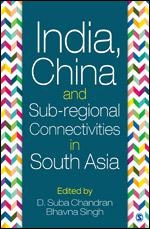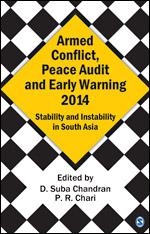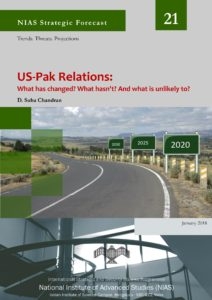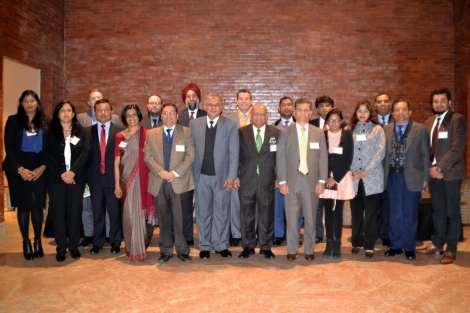subachandran@gmail.com
ph:91-80-22185142(Office-Direct)
91-80-22185000
91-9810326878(Mobile)

About D. Suba Chandran
Prof D. Suba Chandran is currently with the International Strategic & Security Studies Porgramme (ISSSP) National Institute of Advanced Studies (NIAS), Bangalore. His primary focus areas are Pakistan, Afghanistan, Armed Conflicts and Peace Processes in South Asia. He edits an annual titled Armed Conflicts in South Asia, published by the Routledge/SAGE. He is an Associate at the Pakistan Study Research Unit (PSRU), University of Durham, UK. Earlier, he was a Visiting Professor at the Pakistan Studies Programme, Jamia Millia Islamia, New Delh and a Visiting Fellow at the following places: Department of Peace Studies, University of Bradford, UK; ACDIS, University of Urbana-Champaign; and the University of Jammu, J&K.
He holds a PhD in international relations from the School of International Studies, Jawaharlal Nehru University (JNU), New Delhi and a MA in Political Science from Madras Christian College (MCC), Chennai. Until 2015, he was with Director at the Institute of Peace and Conflict Studies (IPCS), New Delhi
Books

Co-Edited
An in-depth analysis of how India, China and other South Asian countries can cooperate on key challenges affecting their bilateral relationships

Co-edited
This volume addresses three major security aspects in South Asia – armed conflicts, peace audit and early warning. The essays span the entire range of armed conflicts, including inter-state and intra-state actors in the region. An innovative attempt is also made to audit the peace processes in conflict-driven environments since certain areas have witnessed an end to armed conflicts. Addressing the gap between the end of violence and the response to peace, it assesses whether peace processes are fragile in South Asia.
The volume further highlights early warning of impending armed conflicts permitting the placement of ameliorative measures for dealing with the situation from a law and order perspective. The role of internal and electoral politics is of special significance here. Topical and up-to-date, the essays address peace processes in Nagaland and Manipur, talks with the Taliban, elections in Nepal, ten years of Indo-Pak cease fire, and the common divide in Jammu and Kashmir, among others
Essays: Book Chapters/ Journal Essays/Reports/Briefs

NIAS Strategic Forecast #21, January 2018
Trump’s New Year tweet on January was almost an ultimatum asking Pakistan to take certain actions towards Afghanistan and the militants groups in the Af-Pak region.
The American threat of “do more” is not a new one; during the last few years, one could see a trend and a déjà vu in the US threats towards Pakistan and the response by the latter. The Trump administration issued a similar threat a few months earlier, followed by attempting to work with Pakistan “one last time”.
However, the threat issued by Trump through a tweet seems to be different. There was a follow up action to the Trump threat; the US administration announced suspending the aid across-the-board.
How far will the US administration go this time in forcing Pakistan to do more? What has changed? And what has not? And what is not likely to?
Lectures/Presentations

Organised by
Near East South Asia Center for Strategic Studies, Daniel K. Inouye Asia-Pacific Center for Security Studies, and Centre for South Asian Studies
Courses
Interns
Newsletter
We love our followers. Subscribe for Monthly CR Newsletter.